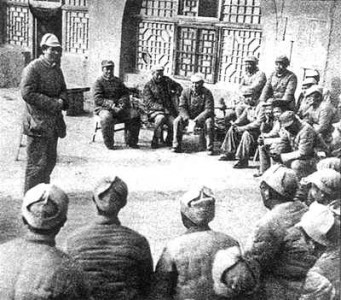The Chinese Communist Party is launching a year-long campaign to clean up the party to do away with corrupt elements in its organization, state-run news agency Xinhua recently reported.
But many Chinese netizens have expressed skepticism toward the campaign, arguing that democracy with the open participation of the people, and not a closed internal process, is the best way to get rid of corruption.
In a high-level party meeting on June 18, 2013, Chinese President Xi Jinping explained the slogan of the party's clean-up campaign: “Look in the mirror, tidy yourself up, wash your body, and treat the illness” (照镜子、正衣冠、洗洗澡、治治病):
照镜子,是在工作作风、廉洁自律上摆问题、找差距、明方向。正衣冠,是自觉把党性修养正一正、把党纪国法紧一紧。洗洗澡,是以整风的精神开展批评和自我批评。治治病,是坚持惩前毖后、治病救人方针,处理有作风问题的党员。
Look in the mirror is to reflect upon the working style. Make yourself clean and disciplined. Find out the differences [between you and the people] and thus the direction. Tidy yourself up is to keep yourself straight according to the morality and discipline of the party. Wash your body is to engage in self-criticism and reflection in alignment with the campaign spirit. Treat the illness is to punish those party members who are corrupted so as to save the patient [the party].

Historical photo of the first Clean-up Campaign in 1941. Mao Zedong gave a talk to the CCP party member in Yan'an. (Public Domain)
However, this is not the first time the Chinese Communist Party [CCP] has expressed a determination to fight internal corruption. There have been at least four major party clean-up campaigns and numerous smaller-scale ones in CCP history.
The first clean-up was conducted in 1942 before the establishment of the People's Republic of China (PRC). The main purpose of the campaign was to consolidate the leadership of the CCP under Mao Zedong. A large number of CCP members were labelled as “anti-revolutionary”, “traitors” or even “spies”. The political slogan at that time was also “self-criticism” and “treat the illness”.
The second clean-up [zh] against party bureaucracy and corruption happened soon after the establishment of the People's Republic of China. About 320,000 CCP members was dismissed, but more than one million new members was recruited.
The third party clean-up campaign happened between 1957 and 1959 against rightists, who criticized the Soviet collectivism model, namely the ideologies of Leninism and Marxist-Leninism. and thus created a potential threat against the one-party dictatorship. Around 550,000 intellectuals were prosecuted and many of them died before the vindication in 1977 marking the end of the Cultural Revolution.
The most recent party clean-up was launched by Deng Xiaoping, the engineer of China's economic reform between 1983 and 1987 to eradicate the supporters of the Gang of Four, a controlling political faction during the Cultural Revolution led by Mao Zedong's last wife that eventually fell out of favor, and prepare for the the country's Open Door policy.
Against such historical background, people's responses towards the announcement of a new clean-up effort were rather skeptical. Many stated that democracy is the key to a successful and thorough clean-up of party corruption.
“Ma Ning's Weibo 2013″ (马宁的微博2013) is a CCP member and has been through three clean-up campaigns since he joined the party. He wrote on popular Chinese microblogging platform Sina Weibo:
掐指一算,自我入党以来,已经历了三次整风 […] 每次都讲党风关系到生死存亡,危机意识不可谓不强。但是党风依旧不佳,廉政依旧遥远。根本问题不解决,恐怕就不会有什么结果。
Since I have entered the party, I have been through three clean-up campaigns so far. […] Every time, it's the same old story that party morality is a matter of life and death. But so far nothing has changed and we are far from being clean. If you don't touch the fundamental problem, there won't be any results.
Wen Jinrang (汶金让), a law professional, believed that the campaign has to include people's participation:
整风要达到自我净化、自我完善、自我革新、自我提高之目的,如果不发动群众对官员进行批评、教育、帮助、提高,一切都是空谈!现在的官员,狡猾大大的,想让他们自我改正,那真是痴心妄想!
Without involving ordinary people to criticize and educate the officials, the campaign will never achieve the purpose of clean-up, self-improvement, self-reform. The officials are so cunning these days, they will never reflect and correct their behaviors.
Both Song Zude (宋祖德), head of a film business in Guangzhou, and “Jilin investigative reporter” (吉林记者调查) spelled out that people should be given votes to clean up the party:
宋祖德:【党内整风是好,就怕流于形式】每次会议似乎都发现了问题,也想解决问题,关键是谁整谁的风,往往上级比下级风气更不正,己不正何以正人?加上都是上级任命的官,有着错综复杂的利益关系,喊几句空口号绝对整不了风,只有让人民参与,给人民选票,歪风不整自灭。
@Song Zude: [party clean-up is good, just worried that it remains at the ideological level] They have identified the problem and want to solve it. However, who should be responsible for the clean-up? Those who are in high ranking positions are usually more corrupt, so how can they be responsible for cleaning up the low ranking officials? Moreover, all of them have embedded interests and entangling relationships. The slogan can't achieve anything without people's participation. Give them the vote and the corruption will vanish.
吉林记者调查:当年“三讲”、“三个代表” 教育不也流于形式了吗,没见实效。整风关键有群众参与,处理一批独断专行,不干实事,违法乱政的领导干部。当然,用选票说话,是最佳解决作风问题的途径。
@”Jilin investigative reporter”: We have been through the “Three Talks” (Campaign to Talk about education, politics and morality in 1995) and “Three Represents” (in 2002), all of these are just ideological campaigns. The key of the campaign should be people's participation. We are now dealing with a group of corrupt party leaders and officials who have no responsibility and pay no respect to people. Only by giving people votes can the problem be addressed.
Apart from giving people the right to vote, many, like “Hello to God” (问候上帝—), pointed out that the party should allow dissent in order to monitor officials:
新一轮的整党整风开始了,纠正四风是当务之急。一个班子没有反对意见,那就是有可能是两个问题:一,是一个英明的决定,二,那就是一把手集权。所以一把手要首先允许有反对意见,这样才能有所谓的民主
@”Hello to God” A new wave of clean-up has begun and it is necessary to correct the four major misbehaviors of officials. There are two possible explanations for the lack of opposition voices within the ruling party: 1. All the decisions are correct; 2. It is a dictatorship. Thus, the leader should allow opposition view and this is the only way for democracy.
Some netizens, such as “My country is so sick” (我的国家超变态) and “Commercial world — wise and strong” (天下为商—灵智枫华), reinstated the need for “rule of law” in China:
我的国家超变态:没有法律,整风就是整人。
@”My country is so sick”: Without law, the clean-up will turn into political prosecution.
天下为商—灵智枫华:什么整风、改革??都完全是法盲口气和腔调,有了整风,还要法律做什么,将司法机关体系置于什么位置?
@”Commercial world — wise and strong” : What is clean-up? Reform?? It sounds as if they know nothing about law. What does it mean for rule of law in this clean-up campaign? And what is the role of our judiciary in the campaign?






